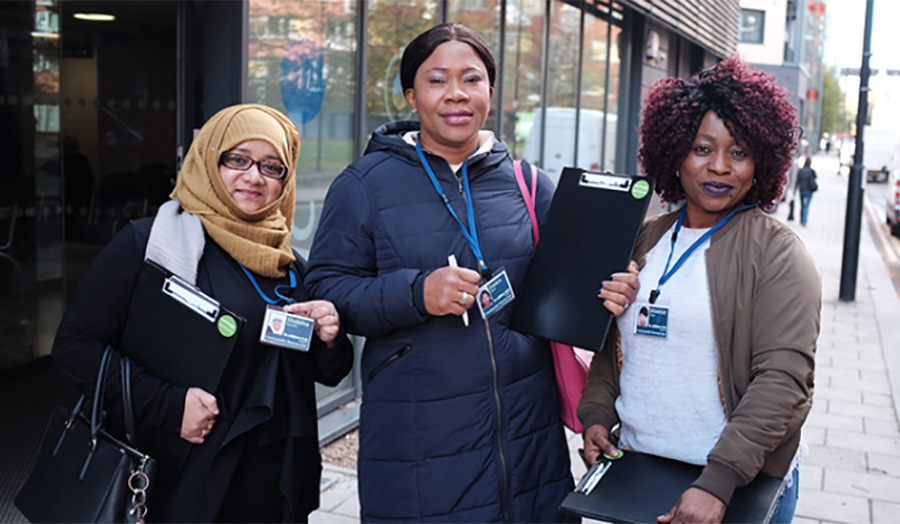Apply for this course
Please select when you would like to start:
If you're a UK applicant wanting to study full-time starting in September, you must apply via UCAS unless otherwise specified. If you're an international applicant wanting to study full-time, you can choose to apply via UCAS or directly to the University.
If you're applying for part-time study, you should apply directly to the University. If you require a Student visa, please be aware that you will not be able to study as a part-time student at undergraduate level.
Applying for September 2024
If you're a UK student or an EU student with settled or pre-settled status applying for September 2024, you can simply call our hotline on 0800 032 4441 or complete our fast-track online application form.
Why study this course?
This is a top-up version of our Health and Social Care BSc (Hons) degree. A top-up degree is the final year (Level 6) of an undergraduate degree course and is for those who have a foundation degree, Higher National Diploma or equivalent qualification, or those wishing to study the final year of their degree in London.
This course is strongly focused on enhancing your job prospects and is aligned to the standards specified by Skills for Health (the Skills Council for the NHS). After completion of the course you’ll be able to demonstrate to prospective employers that your advanced skills conform to the National Occupational Standards (NOS).
Fully validated by the CIH
Our Health and Social Care course is also fully validated by the Chartered Institute of Housing (CIH), so if you choose to specialise in housing you'll receive free student membership of the CIH
Study health and social care in a modern context
This course is informed by current and expected changes in the UK healthcare sector, including advances in healthcare technology, quality concerns and the rising cost of providing care
Third in London for student satisfaction
Our social work courses are ranked third in London for overall student satisfaction in the Complete University Guide 2025
Course modules
The modules listed below are for the academic year 2024/25 and represent the course modules at this time. Modules and module details (including, but not limited to, location and time) are subject to change over time.
Year 3 modules
Academic skills & literacy: effective critical thinking
This module currently runs:autumn semester - Thursday afternoon
(core, 15 credits)
This module aims to enable students to:
- Further apply prior knowledge and relate specific knowledge and skills to continuing development of academic literacy and skills
This module builds on knowledge and skills acquired in the first and second years of the course and specifically on the academic skills acquired in SH4053 Academic skills/literacy: finding & presenting information and SH5054 Academic skills/literacy: Developing critical thinking. In this, the last of three academic skills and literacy modules in the course, students will extend their academic literacy and skills to enable them to produce work appropriate to this academic level with specific emphasis on the standard of work required by SH6P06 Project.
Read full detailsEffective responses to emerging issues in health & social care
This module currently runs:all year (September start) - Friday morning
(core, 30 credits)
This module builds on work done previously in the first year in Introduction to Health & Social Care; concepts of health & well-being and during the second year as part of Advancing the Health of the population: Understanding Public Health. This module aims to enable students to use and build on the knowledge and understanding gained in these modules to analyse and critically evaluate current and emerging responses to key challenges facing the health and social care sector. The modules therefore aims to ;
• provide a critical understanding of the emerging issues in contemporary health and social care at both policy and practice levels.
• consider the relationship between the social determinants of health and policy and practice responses to health and social care issues
• critically examine implicit theoretical perspectives underpinning key approaches to tackling health inequalities.
• develop understanding of a range of theoretical perspectives related to health creation and initiatives to tackle health inequalities; social prescribing, asset-based approaches, community development.
• consider the practical and ethical implications for the health and social workforce of current and emerging responses to a range issues
Read full detailsPersonal & Professional Development; management & leadership of others
This module currently runs:spring semester - Thursday afternoon
(core, 15 credits)
The module focuses on the student’s personal and professional development in preparation for graduation from the Course. There is particular emphasis on the development of graduate skills and competencies with a focus on the management and leadership of others. Emergent graduate skills are developed to prepare the student for professional practice and/or further studies.
Key skills and knowledge gained on the module include:
Team-work skills; communication skills; leadership and management skills ; values-based leadership in healthcare; NHS workforce Race Equality Standards; the Skills for Care Leadership Qualities Framework; collaborative leadership skills ; NHS Five Year forward View and Long Term Plan; leadership for inclusivity and diversity;
Read full detailsProject
This module currently runs:all year (September start) - Friday afternoon
(core, 30 credits)
This module draws together strands from a number of modules students have previously undertaken and are concurrently studying. Principally, this builds on students’ understanding of the nature of knowledge and evidence in health and social care contexts derived from Introduction to Knowledge and Inquiry in Health & Social Care in the first year and on the more specific focus on research in Ethical Research & Practice in the second year. The specific focus of the work carried out by individual students as part of this module will also be informed by their broader examination of health and social care issues in other modules across the course as a whole.
The module therefore aims to:
- enhance students’ understanding of approaches to research and evaluation
- enable students to engage actively with research methods and findings relating to their profession
- enable students to generate research questions and formulate a research proposal
- enable students to integrate and apply the skills and knowledge base underpinning their professional education in a sustained piece of independent investigation
Global Health
This module currently runs:spring semester - Thursday morning
(option, 15 credits)
Global Health is a Level 6 module for the BSc Health and Social Care Course. The Module aims to give students an opportunity to critically study the interconnectedness of key challenges of human development and human health and healthcare across nations within global contexts. It will provide content that will help students understand the key global challenges that affect human health and healthcare and cause health inequalities and inequities across the nations. The Module will also provide an opportunity to study key global actors and global interventions to improve human health of all people across nations and promote health equities. This will require students to critique global co-operation and partnership in fighting key challenges of global human health and healthcare.
Therefore, the Module aims are to:
• develop and produce graduates with global citizenship attributes by embedding the notion of ‘think globally and act locally’ (‘think globally for local actions’) in its curriculum
• develop a critical knowledge base of concepts, principles, measurements and theories of global health and healthcare based on the notion of ‘global health crisis’
• build a critical understanding of the key challenges of the growing global interconnectedness on global human health and healthcare
• identify and critique the determinants and evidence of global health inequalities and inequities
• examine the influence and contribution of health systems in improving human health around the world
• consider complexities in solving global health and healthcare problems found in past and contemporary case-studies and draw implications from them for future research, policy and practice in global health
Homelessness and Housing Policy
This module currently runs:autumn semester - Thursday morning
(option, 15 credits)
In this module, you will look at one of the most pressing social issues in the UK today – that of the cost and shortage of housing and of the shortage of affordable housing in particular. Living in a safe, comfortable and secure home is a human right, essential to our wellbeing. However, it is widely agreed that we have a housing crisis in the UK. This crisis is perhaps especially acute in London but it is a crisis which affects much of the country. Over the past ten years, the cost of housing, including rents in the private rented sector have spiralled while the number of social rented homes has continued to fall and the numbers of people who are homeless or living in temporary accommodation has risen. In this module, you will look at the scale and at the underlying causes of the housing crisis in the UK. You will look at the shortage of affordable housing, the growth of the private rented sector and at the collapse of social rented housing. You will also look at how access to housing and the housing market reflects wider social divisions in terms of class, ethnicity and gender. The module places housing and housing policy at the core of our understanding of society, social divisions and social policy.
The module focuses on housing policy and on social housing, looking at the history of social housing in the UK and at changes in housing policy since the 1980s. The module also looks at the growth of homelessness and at the underlying causes of the growing level of homelessness. You will look at homelessness policy, at good practice models of how to tackle homelessness and at the link between housing and poverty and the importance of both housing and welfare policy as instruments of poverty reduction.
The aims of the module are to:
- understand what the housing market is and how it works
- develop an understanding of the problems in accessing decent housing in the UK, how widespread the problems are, which groups suffer most and why these problems appear to have worsened over recent years
- develop data handling and data analysis skills to collect and analyse relevant data on housing and the housing crisis in the UK
- develop and demonstrate an understanding of housing policy and housing policy changes in the UK
- develop policy analysis and policy evaluation skills
- understand how the housing market reflects the different economic and political ideologies which shape housing policy
Housing Issues and Housing Solutions
This module currently runs:spring semester - Thursday morning
(option, 15 credits)
Housing Issues and Housing Solutions outlines the key issues that face people working in housing, residents and community workers. It will focus on a practical approach to dealing with community-related & housing issues, their causes and solutions. It will examine the rights and obligations of residents and identify good practice in key management areas such as resident involvement, dealing with anti-social behaviour and disrepair. Combined with other modules in the faculty, such as ‘Housing and Homelessness’, this module provides a housing pathway for students wishing to develop or further their careers in this area.
The module aims to:
- Place changes in housing management in the context of wider social, economic and organisational changes; (A01)
- Introduce the key practical issues facing housing professionals, and good practice in addressing these issues; (A02)
- Identify ways in which housing service users and community workers can challenge poor performance and get involved in service improvement; (A03)
- Examine the benefits and challenges of partnership working in dealing with housing issues; (A04)
- Explain current discussions on the balance of rights and responsibilities for social housing tenants and other local residents. (A05)
Mental health & well being
This module currently runs:autumn semester - Thursday morning
(option, 15 credits)
This module provides opportunities for students to develop their understanding of key issues in mental health practice and policy, as well as critically discuss relevant theoretical and conceptual issues relating to mental health.
The module aims to:
- Develop understanding of key concepts in mental health and well-being
- Develop awareness of mental health diagnoses and implications of these to the individual, health services, and wider society
- Develop knowledge of key policy and practice issues in mental health through
- Provide opportunities to critically evaluate and reflect upon models and theories of mental health and well-being


.jpg)







